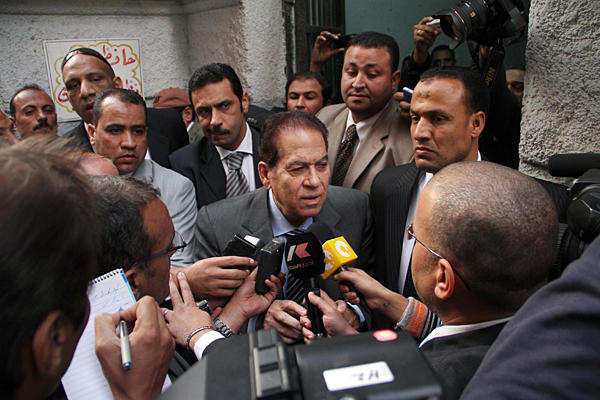
SCAF member Mokhtar al-Mullah said that parliament’s authority to choose the 100-member assembly that will draft the constitution will be constrained by military-approved "parameters" agreed beforehand. Meanwhile, the SCAF announced the formation of a 30-member civilian advisory council that will advise the military and provide input on the selection of the constitutional committee.
ADVISORY COUNCIL:
1) In a December 8 decree, the SCAF announced the formation of a 30-member civilian advisory council that includes presidential candidates Ayman Nour and Mohamed Salim al-Awa along with Wasat leader Abu Ela Madi, former NAC coordinator Hassan Nafaa, Wafd leader Sayyid al-Badawi, Nour leader Emad Adel Ghaffour, and Free Egyptians leader Naguib Sawiris. The council “will assist the SCAF in all matters of concern to the country and public opinion” until the presidential election, expected no later than the end of June. The council’s first priorities will be to provide input on draft legislation regulating the presidential election and the formation of the 100-member constituent assembly that will draft Egypt’s next charter. The Brotherhood announced that it has withdrawn its two representatives from the council, Mohamed Morsi and Mohamed Yassin, over concerns that the council would encroach on the powers of parliament. The council is expected to hold its first meeting on Sunday, December 11. [al-Shorouk, Arabic, 12/8/2011] [al-Ahram, English, 12/9/2011] [al-Ahram, English, 12/9/2011] [The Daily News Egypt, English, 12/9/2011]
NEW CABINET:
2) Defending his track record as Hosni Mubarak’s prime minister between 1996 and 1999, newly appointed Prime Minister Kamal Ganzouri said he prioritized the public interest over Mubarak’s agenda. “There were things I did over my four years as prime minister that did not satisfy the president and those around him, even though they were in the public interest,” Ganzouri said. [al-Shorouk, Arabic, 12/9/2011]
3) The presidential powers delegated to Prime Minister Kamal Ganzouri are “only temporary” according to a military source, who said that parliament’s traditional legislative powers will be resotred as soon as the new assembly comes into session. [al-Ahram, English, 12/9/2011]
4) Prime Minister Kamal Ganzouri claimed that protesters denouncing the new cabinet represent “a very small minority.” Protesters are continuing their sit-in outside of the cabinet building for a sixteenth day. [al-Masry al-Youm, English, 12/9/2011]
CONSTITUTION:
5) At a press conference on December 8, SCAF member Mokhtar al-Mullah said that parliament’s authority to choose the 100-member assembly that will draft the constitution will be constrained by military-approved "parameters" agreed beforehand. Al-Mullah outlined a new roadmap for drafting the constitution, starting with the formation of a 30-member military-appointed civilian advisory council announced in a separate SCAF decree that will function as an intermediary between the SCAF, parliament and the cabinet. Although the SCAF has offered assurances that the advisory council will represent all political forces, the Brotherhood’s Freedom and Justice Party has already withdrawn its representative, citing misgivings about the advisory council’s anticipated intervention in the constitutional process. According to the plan outlined by al-Mullah, these four bodies – three of which were chosen by the SCAF – will need to reach consensus on the composition of the 100-member assembly. [Al Jazeera, English, 12/8/2011] [EgyptSource, English, 12/8/2011] [al-Shorouk, Arabic, 12/8/2011]
6) Saad al-Husseini, a member of the FJP’s Executive Bureau, threatened that the Brotherhood will call people into the streets if the advisory council tries to choose the members of the constitutional assembly, which is the right of parliament. Al-Hussein said that a fairly elected parliament is the only institution that expresses the will of the people. [al-Masry al-Youm, Arabic, 12/9/2011]
ISLAMISTS:
7) A member of the Salafi Nour Party’s supreme committee claimed that democracy is “heresy” because it contradicts the Islamic principle of allegiance, whereby the people are bound to their chosen caliph by unconditional loyalty. Speaking at a rally in Giza, Shaaban Darwsh also called the liberal-oriented Egyptian Bloc a campaign of “Zionism and “Freemasonry” and said, “We must obliterate the liberalism that was introduced by Sadat and Mubarak and reinstate the rule of Islam.” [al-Masry al-Youm, English, 12/9/2011]
8) Kefaya founder and former parliamentary candidate George Ishak demanded that the Muslim Brotherhood and Salafis reveal the sources of their campaign funding. In November, an Egyptian government report found that a leading Salafi association, Al-Sunnah al-Mohammadiya, received almost $50 million this year from religious associations in Qatar and Kuwait, but it is unclear whether any of these funds were spent on the campaigns of Salafi parliamentary candidates. [al-Ahram, English, 12/9/2011]
U.S. POLICY:
9) State Department spokesman Mark Toner said that the U.S. has halted tear gas exports to Egypt. According to Toner, there are no current licenses for exporting tear gas canisters to Egypt, and the last shipment of canisters took place a week ago. [al-Masry al-Youm, English, 12/9/2011]
ECONOMY:
10) SCAF member General Mokhtar al-Mullah said that the military has not accepted a $3.2 billion dollar financing package from the IMF because to avoid burdening Egypt’s next government with excessive debt. Al-Mullah said that the government will consider an international loan in cases of “extreme need.” [The Daily News Egypt, English, 12/9/2011]
11) Egypt has negotiated a 25 million-euro grant for development projects with the European Union and World Bank, for projects in five Upper Egyptian governorates over the next four years. [al-Masry al-Youm, English, 12/9/2011]
Photo Credit: Associated Press
Image: 1207-Egypt-military-new-parliament_full_600.jpg

